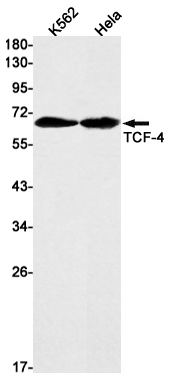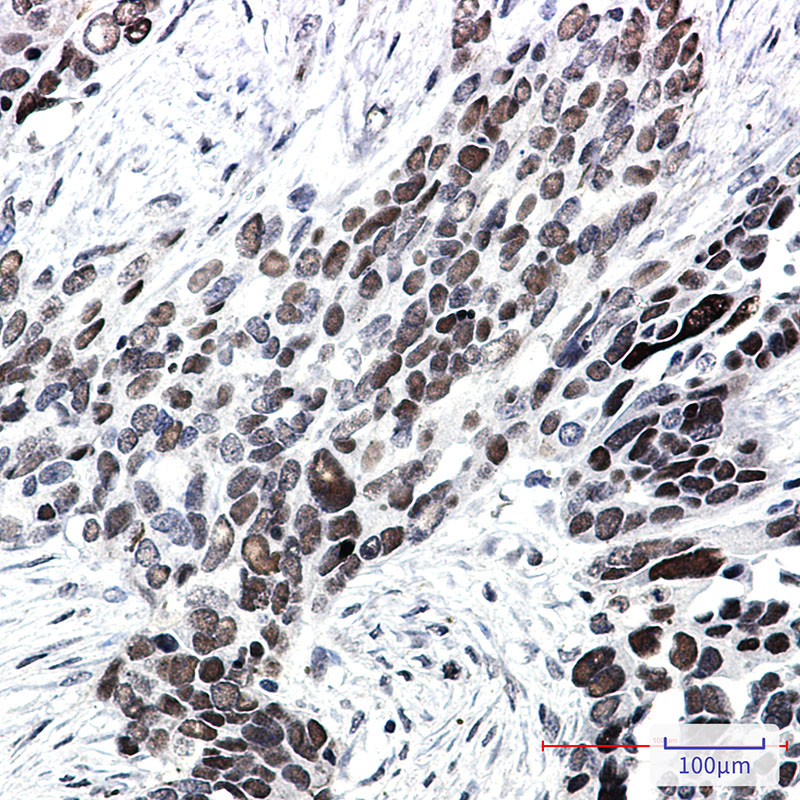

| WB | 1/500-1/1000 | Human,Mouse,Rat |
| IF | 1/20 | Human,Mouse,Rat |
| IHC | 1/50-1/100 | Human,Mouse,Rat |
| ICC | 技术咨询 | Human,Mouse,Rat |
| FCM | 咨询技术 | Human,Mouse,Rat |
| Elisa | 咨询技术 | Human,Mouse,Rat |
| Aliases | TCF7L2; HMG box transcription factor 4; HTCF-4; T-cell factor-4 variant X2; T-cell factor 4; Transcription factor 7-like 2; TCF-4 |
| Entrez GeneID | 6934 |
| WB Predicted band size | Calculated MW: 68 kDa; Observed MW: 68 kDa |
| Host/Isotype | Rabbit IgG |
| Antibody Type | Primary antibody |
| Storage | Store at 4°C short term. Aliquot and store at -20°C long term. Avoid freeze/thaw cycles. |
| Species Reactivity | Human |
| Immunogen | A synthetic peptide of human TCF-4 |
| Formulation | Purified antibody in TBS with 0.05% sodium azide,0.05%BSA and 50% glycerol. |
+ +
以下是3-4篇关于 **Transcription Factor 7 Like 2 (TCF7L2) 抗体**的参考文献及其简要摘要:
---
1. **"Variant of transcription factor 7-like 2 (TCF7L2) gene confers risk of type 2 diabetes"**
- **作者**: Grant, S.F. et al.
- **摘要**: 该研究通过基因关联分析,首次发现TCF7L2基因变异与2型糖尿病风险显著相关。实验中利用TCF7L2抗体进行Western blot和免疫组化,验证其在胰岛β细胞中的表达及功能。
2. **"TCF7L2 polymorphisms and progression to diabetes in the Diabetes Prevention Program"**
- **作者**: Lyssenko, V. et al.
- **摘要**: 探讨TCF7L2基因多态性对糖尿病发展的影响,使用TCF7L2抗体检测患者外周血单核细胞中蛋白表达水平,发现特定变异体与胰岛素分泌缺陷相关。
3. **"The TCF7L2 locus and epigenetic regulation of gene expression in colorectal cancer"**
- **作者**: Duval, A. et al.
- **摘要**: 研究结直肠癌中TCF7L2的启动子甲基化状态及其对Wnt信号通路的影响,通过ChIP实验(使用TCF7L2抗体)揭示其与靶基因结合的调控机制。
4. **"TCF transcription factors: molecular switches in carcinogenesis"**
- **作者**: Korinek, V. et al.
- **摘要**: 综述TCF家族(包括TCF7L2)在Wnt/β-catenin通路中的作用,强调TCF7L2抗体在定位其核内表达及研究癌症中异常激活的应用。
---
以上文献涵盖了TCF7L2抗体在糖尿病、癌症机制及表观遗传学研究中的典型应用(如Western blot、免疫组化、ChIP等)。如需具体实验细节或DOI号,建议通过PubMed或Google Scholar按标题检索。
**Background of Transcription Factor 7 Like 2 (TCF7L2) Antibody**
Transcription Factor 7 Like 2 (TCF7L2), a member of the T-cell factor/lymphoid enhancer-binding factor (TCF/LEF) family, is a critical transcriptional regulator in the Wnt/β-catenin signaling pathway. It binds to β-catenin to activate target genes involved in cell proliferation, differentiation, and glucose homeostasis. TCF7L2 gained prominence due to its strong association with type 2 diabetes (T2D), identified through genome-wide association studies (GWAS), where specific variants significantly increase disease risk. It influences pancreatic β-cell function and insulin secretion, making it a key focus in metabolic disorder research.
TCF7L2 antibodies are essential tools for studying its expression, localization, and interaction mechanisms. They are widely used in techniques like Western blotting, immunohistochemistry (IHC), and chromatin immunoprecipitation (ChIP) to detect TCF7L2 protein levels, tissue distribution, and DNA-binding activity. These antibodies help elucidate its dual role in health and disease, including its oncogenic or tumor-suppressive functions in cancers like colorectal carcinoma.
Research applications also extend to exploring TCF7L2’s regulatory networks in development and disease pathogenesis, providing insights into potential therapeutic targets. Validated antibodies with high specificity are crucial for ensuring reproducibility in studies linking TCF7L2 dysregulation to diabetes, cancer, and other disorders.
×